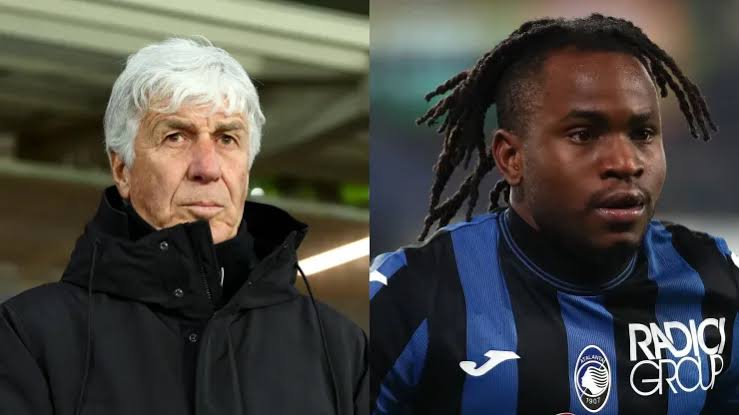Gasperini vs Lookman contention, who takes the fault?

Atalanta head coach, Gian Pierro Gasperini and Atalanta forward, Ademola Lookman. Photo Credit- World Soccer Talk
The UEFA Champions League play-offs between Atalanta and Club Brugge did not only end in an embarrassing defeat for the Italian side but included the verbal altercations between two well regarded members of the club. The recent public dispute between Atalanta’s head coach, Gian Piero Gasperini, and forward Ademola Lookman has raised up discussions about leadership, player management, and communication within professional football.
This incident, stemming from a missed penalty during a crucial UEFA Champions League match against Club Brugge, offers a lens through which to examine the responsibilities of both coaches and players in maintaining team cohesion and morale.
The Incident: A Closer Look
During the second leg of the Champions League playoff on February 19, 2025, Atalanta faced a daunting task, trailing 2-1 from the first leg. Early in the second half, Lookman provided a glimmer of hope by scoring, reducing the deficit. However, the momentum shifted when Lookman’s penalty attempt was saved by Club Brugge’s goalkeeper, Simon Mignolet. This miss was pivotal, as Atalanta eventually succumbed to a 3-1 defeat, resulting in a 5-2 aggregate exit from the tournament.
READ ALSO
Ademola Lookman: Stay at Atalanta or Move to a Bigger Club?
Lookman’s CAF Victory: A Story of Embracing Nigerian Heritage
Gasperini’s Public Critique
In the post-match press conference, Gasperini did not suppress his words regarding Lookman’s missed penalty. He stated, “Lookman wasn’t supposed to take the penalty. He’s one of the worst penalty takers I’ve ever seen.” Gasperini further emphasized that designated players, such as Charles De Ketelaere or Mateo Retegui, should have assumed the responsibility. This public ridicule not only highlighted a breach in team protocol but also casts a defamation on Lookman’s abilities.
Lookman’s Response
As expected of anyone who bears the feeling of being subjected to unjust remarks, Lookman took to social media to express his dissatisfaction. He described Gasperini’s comments as “deeply disrespectful” and clarified that he stepped up to take the penalty upon the instruction of a teammate. Lookman emphasized his commitment to the team and lamented being singled out in such a manner, especially after his consistent contributions since joining Atalanta.
Analyzing the Fault Lines Between Gasperini and Lookman
With this controversy between Gasperini and Lookman, the media has had a field day. Several debates has ensued amongst football enthusiasts across the globe on the contention, while some have commended Lookman initiative, others have pitch their tent in Gasperini’s camp, claiming that the coach was right in his initial statement about Lookman to the press. However, this controversy brings to the forefront several critical issues:
Gasperini’s decision to publicly criticize Lookman can be seen as a way of undermining your trust in the player as well as the player’s confidence. While his criticism may be justified, true and essential, however making such grievances in the public domain can put a strain on the trust and morale of the players.
Additionally, Lookman deviation from established penalty-taking protocols, indicates an action considered as indiscipline. However, his assertion that he was directed by a teammate suggests possible miscommunication in on-field decision-making processes. But here comes the question, Lookman is an experienced player who should know his strength and weakness, since his weakness is taking penalties, he should have still left it for the first-choice penalty taker like Retegui to take the spot kick rather than accept their insistence on him to take it. This action if considered would have prevented his strife with Gasperini.
Furthermore, effective coaching extends beyond tactical ability; it encompasses the ability to manage diverse personalities with empathy. Gasperini’s remarks may reflect a lack of emotional intelligence, which is crucial in maintaining a harmonious team environment especially in situations where the atmosphere is filled with discouragement and hopelessness.
Recommended Pathways to Resolution
Players having rivalries with their coaches is no stranger in football. The controversy surrounding Gasperini and Lookman is just one out of thousands that have occurred in football’s history. However, it is crucial that they amend the rift and foster a positive atmosphere. Hence, the following ways are advisable to resolve the issue before it gets worse, affecting the club’s reputation:
Foremostly, Gasperini and Lookman should engage in a candid, private discussion to address grievances, clarify misunderstandings, and reaffirm mutual respect. In addition, revisiting and reinforcing team protocols regarding responsibilities, such as penalty-taking, can prevent future ambiguities and ensure all players are aligned with the coach’s expectations and finally, issuing a joint statement or holding a press conference to demonstrate solidarity can help reduce media speculation and showcase a united commitment to the team’s objectives.
Conclusion
The Gasperini-Lookman incident serves as a interesting reminder of the delicate balance required in sports leadership. While accountability and discipline are paramount, they must be administered with respect and empathy. By addressing internal conflicts with discretion and understanding, teams can transform challenges into opportunities for growth, ultimately enhancing both performance and cohesion.

